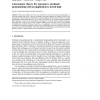Free Online Productivity Tools
i2Speak
i2Symbol
i2OCR
iTex2Img
iWeb2Print
iWeb2Shot
i2Type
iPdf2Split
iPdf2Merge
i2Bopomofo
i2Arabic
i2Style
i2Image
i2PDF
iLatex2Rtf
Sci2ools
MP
2006
2006
Convergence theory for nonconvex stochastic programming with an application to mixed logit
Monte Carlo methods have been used extensively in the area of stochastic programming. As with other methods that involve a level of uncertainty, theoretical properties are required in order to give an indication of their performance. Traditional convergence properties of Monte Carlo methods in stochastic programming consider global minimisers or first-order critical points of the sample average approximation (SAA) problems as well as of the true problem. In this paper we review the first-order critical convergence and extend these results to the case where computed solutions are second-order critical, in turn allowing for problems whose objective function is nonconvex. As an application, we use the proposed framework in the estimation of mixed logit models for discrete choice, guaranteeing almost sure convergence of the solutions of the successive SAA problems. The result is observed to hold both for constrained and unconstrained problems. Finally, we produce estimates of the simulatio...
| Added | 14 Dec 2010 |
| Updated | 14 Dec 2010 |
| Type | Journal |
| Year | 2006 |
| Where | MP |
| Authors | Fabian Bastin, Cinzia Cirillo, Philippe L. Toint |
Comments (0)

